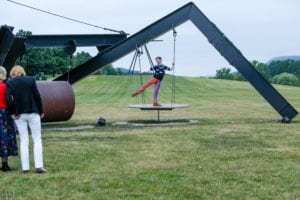All black everything. That’s how New York City artist and resident Gabriel J. Shuldiner feels about his work. Art Zealous paid a visit to his studio where there was literally black everywhere, to windows to the walls, no exaggeration. We should note that Shuldiner’s personality is anything but. Gracious and witty, he gave us a tour around his studio where we discussed his art, music, fashion and of course, the color black.
Art Zealous: How did you get into the arts?
Gabriel J. Shuldiner: I did what I always did and never thought much about it. I played around with stolen street signs that I had accrued from growing up in the city. I added stickers to them and spray painted them. Black was always involved. I never thought of myself as an artist. I never thought of that as an avenue for me.
AZ: How did you view art when you were younger?
GJS: When I was seven years old, I had this thing called the “Art Mall.” I’d make these paintings, put them up in my room, and then every time my mom or my dad passed through the hallway, they would have to come into my room. There was like a five dollar limit. You’d have to buy this work or buy that work. It was fun, but I know that they got sick of it since you’d have to pass by my door. So after a while, they were like we don’t have any more money. So I made them credit cards, and then I’d give them the bill, once a month.
There was a moment when right after I got my art dealer and she brought a collector in. He was looking at my work, and he was like “this guy, this guy,” – he was just pointing. We had just priced everything, and I felt like that this was the adult version of the “Art Mall.” It was the same thing, though this guy wasn’t my dad, and the paintings weren’t ten cents. It was real. That’s when I really felt like, wow, that’s a dream come true.
I knew what I wanted to do at seven years old. I don’t know if I lacked confidence, or what. But it was also a life experience. If I didn’t spend time in the record industry, if I didn’t go through whatever I went through, I don’t know if the work would be what it was. The art comes first, and it really saved my life on a serious level. I’m adamant that I want to make all of my income from my art. But, the reality is that if I never sold another piece, I’d still make the work and it’d be just as important to me, in terms of my existence.
AZ: What’s your morning ritual like?
GJS: I get to the studio between 10:30 and 11 am, and I consider it a job. It’s like the best job in the world. I’m here every day, sometimes for an hour or eight. Honestly, if I don’t paint, I go crazy. It’s something I need to do. It’s like going to the gym.
AZ: Do you listen to music while you paint?
GJS: I listen to music. I’m always in my own little world. People are always knocking on the door, and I’m in my own world. I listen to everything from jazz to Motörhead. I was in the record industry prior to art. I wanted to run a record label, that was my thing. It was pre-iPod, around 2001. I left that industry because I was burnt out. I didn’t realize at the time that I was an artist, and I was slowly going crazy. I didn’t realize at the time that that was my vehicle.
The free time, the effect art had on my mind, it was so soothing, meditative, calming. Something happened, and I just had that moment. This is what I’m supposed to do with my mind. And then I had weird flashbacks to grade school, and it was always art. But my concept of what art was in my mind is so not what art was supposed to be or what I thought it could be.
For me, as a child growing up in Manhattan, going to the Met was torture. I just couldn’t relate to it. But I loved graffiti, I loved cracked concrete in streets, architectural building, like cracked-out, decayed buildings, those were gorgeous to me. I never had a desire to do figurative work. To me, it was as simple as you’re not an architect and you’re not an artist if you’re not into replicating things perfectly visually with pen and ink and hand.
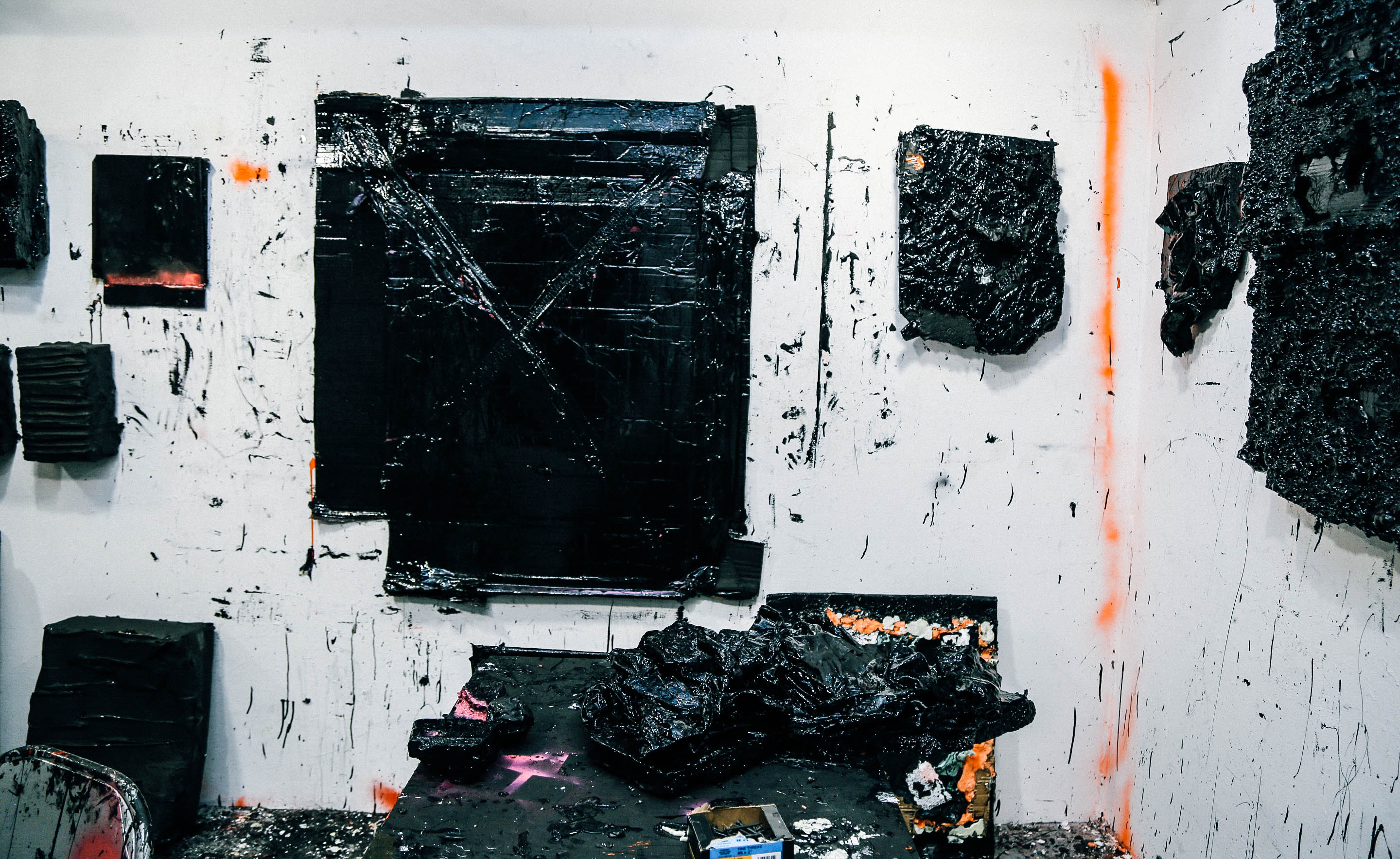
AZ: To say you use a lot of black would be an understatement, so why the color black?
GJS: For me, it’s a sexy black sports car or a hot black dress. Fashion. It’s timeless. But probably the most cerebral aspect to it is space, nothingness. Black is both all color and no color. In Sumi ink and Zen culture, it represents the void.
One of the rules I made is that I would always paint in white and black. Growing up, I didn’t know you could do that. I didn’t go out of my way to take art classes, but I must have taken enough to know that someone must have told me artists don’t use black and they don’t use tape. You make lines by hand. So, to this day, I still use tape and black.
Once you learn about the history of the color black in contemporary art, you learn that it was the first color that these cave painters were using – black ash, back in the day. A friend of mine, invented Vantablack, the darkest color of the world. It’s what they’re painting chips with for heat, to save energy; it’s on the space station right now. Black has been there from the beginning and it’s there right now in this cutting, 21st-century technology, and it’s really going to change the world. Eventually, I think it’s going to be used more commercially, but now it’s super scientific, and used for satellite stuff.
I’ve been into black for forever. But I wasn’t the goth. People who read my work as goth makes me laugh. Everyone has their read. How ironic would it be to make a living off of black paintings. The irony is that it sells. To me, black is very calming.
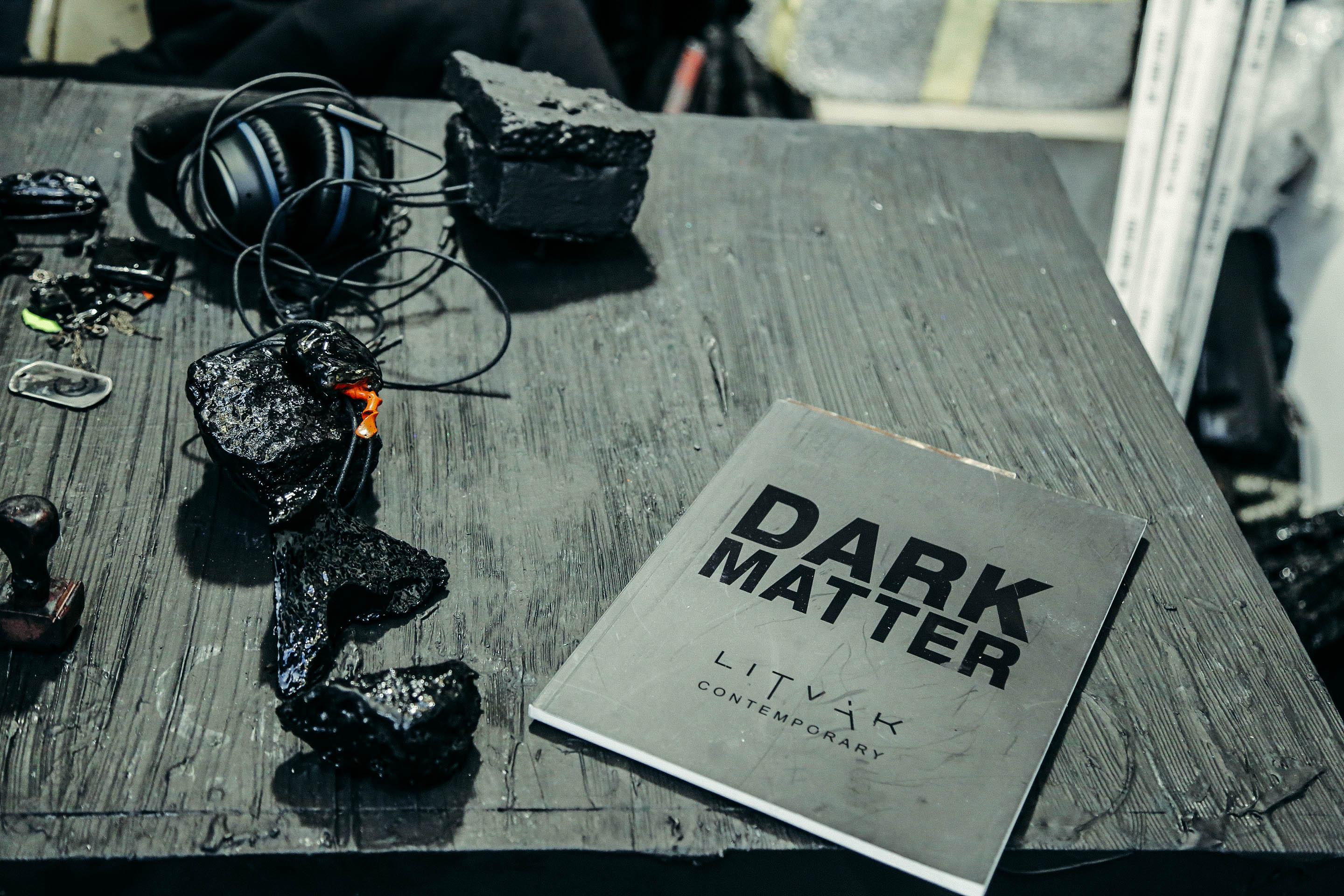
AZ: How do people interact with your work?
GJS: I’ve never experienced more disparate responses from people saying, “these are super, super dark and depressing,” or “these are so sexy and glamourous.” I just love that.
AZ: Are you a jewelry designer or an artist? How do you answer that question?
GJS: I don’t want to be viewed as a jewelry designer, which I did for a couple of years right out of Parsons.
AZ: Tell us about your jewelry.
GJS: I made small, one of a kind, individual pieces. I was basically making small maquettes for larger sculptures. They came from part of my process of deconstruction, when I’d saw, cut, tear, rip larger pieces to like kind of edit them. So then I had these awesome chunks, which I didn’t want to trash. So you know, I’m looking at them and I was inspired by them. I started putting steel chains on them and replicated what I’d do if I had the space for a commission.
I had a beautiful website called Gabriel Jewelry. I was going that route. Before all of these galleries moved into the Lower East Side, I was in all these really sweet shops that sell black objects. Then they all closed and the galleries moved in. From a business perspective, it’s almost easier to sell a $5,000 painting than a $300-$500 bracelet. And it’s the same clientele, theoretically. I called them Post-Apocalyptic Black Charcoal Necklaces™.
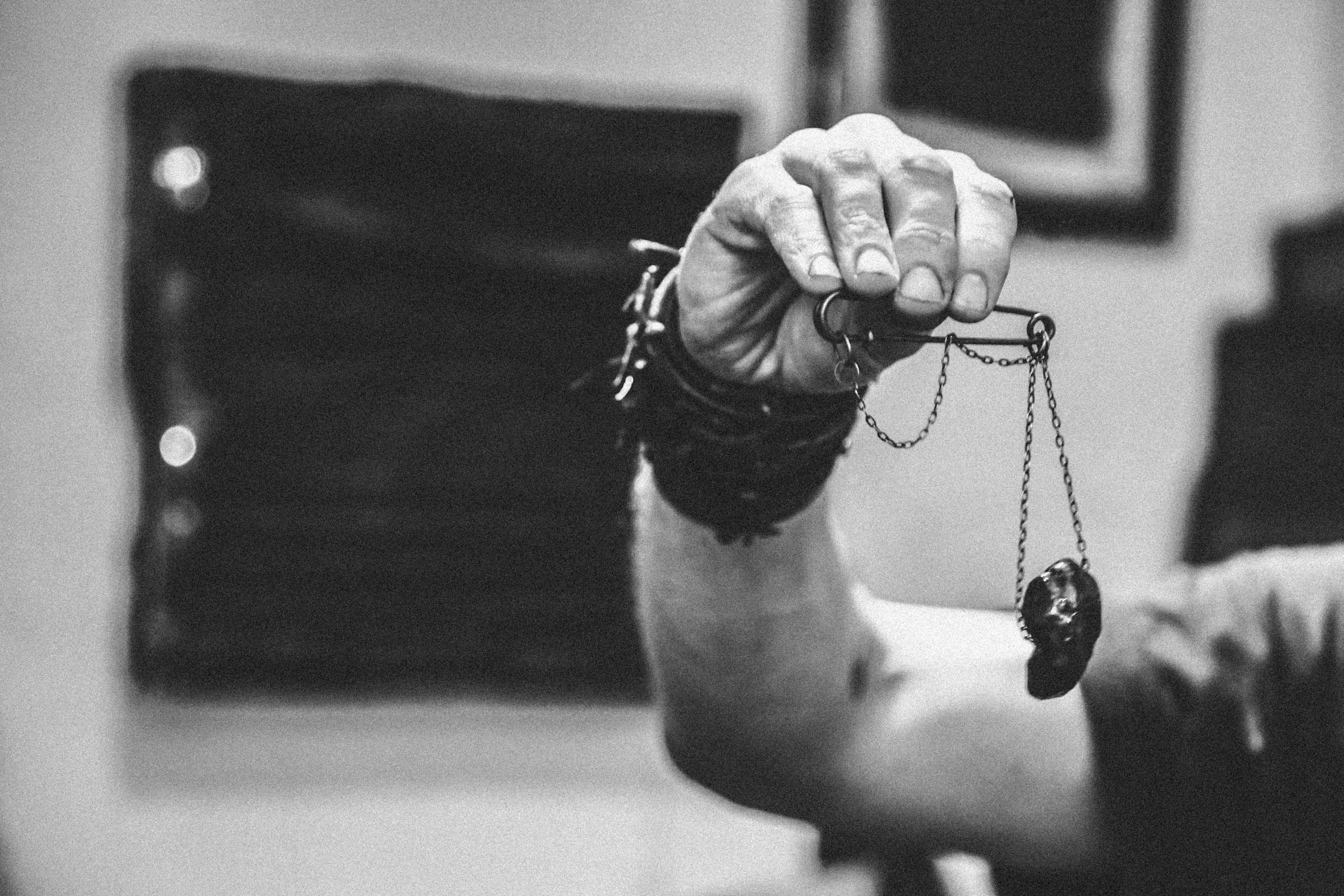
AZ: Is that trademarked?
GJS: It is trademarked. But it’s also a play on trademarking. I call my work bruteminimalism™. It’s just a term I made up and I put the trademark next to that. It’s a play on product.
AZ: What are your thoughts on the intersection between fashion and art?
GJS: I think there’s always been one, and you can tune into it as much as you’d want. It’s a hard call. The designers I like are artists. One of my favorite designers is Uma Wang. Her work is just mind bending. But then, the price point is so high, and that is art.
Then you have designers like Zara knocking designers off. It’s such a weird, hard time for emerging designers, between the economy and the internet. There is some fashion that I think is art, both historically and contemporary. Some of my necklaces were just in a show at the FIT museum. My friend Suzanne Bartsch has been wearing all of these designers for years and they did the whole history of some of her outfits, and some of my designs were included, which is rad.
AZ: Who are some of your all-time favorite fashion designers?
GJS: Julius from Japan and Yohji Yamamoto.
AZ: What would be your dream collaboration?
GJS: Anything to do with architecture. Charles Renfro’s firm, Diller Scofido + Renfro does absolutely incredible work. He came to my studio last year and the way he spoke about my work, he totally got it. One of the best studio visits I’ve ever had. Also my friend, Matthias Hollwich. I’ve worked with him before, but would love to do it again.
AZ: You’re active on social media. What are your thoughts on artists using social media?
GJS: It’s a tough call. On one hand, I feel like the business part of me knows yes, I can make this work. It’s very personal, it’s very cathartic. At the same time, I know there’s a ton of money out there, and even though you get different reactions, depending on who you talk to, I’m very open about the fact that I want to sell my work. I now have proof, since May, that it sells.
Social media has helped me. But I have blinders on, I don’t really care who else is using it. I just know that I would not be using it to post photos of my food, or where I’m at right now, like “I just checked into CVS.” I could care less about that. I follow animals, cute little animals on Instagram and I post photos of my dog and my art. You never know who’s going to see it.
I’ve met so many people who I would not have met at this point in my career through social media, so I think it’s been completely valuable and very important. But, at the same time, I see what social media has done. There’s a dumbing down effect it has that anyone can take a photo, post it, and you’re a photographer or an artist. How many followers you have dictates if you’re any good. From a small business perspective, I think it’s clever, it’s great. It’s the world we live in.
I know statistically, there are more people buying art now than ever. I don’t know if that’s just because you can go online and click on Artsy and see like hundreds of artists. In the past, people who would theoretically buy that work would maybe be intimidated to go into the gallery, because of that preconceived notion that art is not accessible to everyone. The way I see it is I just make my work, and I get it out onto the world however I can do it. If that involves Instagram, Facebook, that’s what I do. If it involves sending images, like as an attachment, that’s what I do. If it involves getting people into my studio, that’s what I do. For me, it’s just another vehicle.
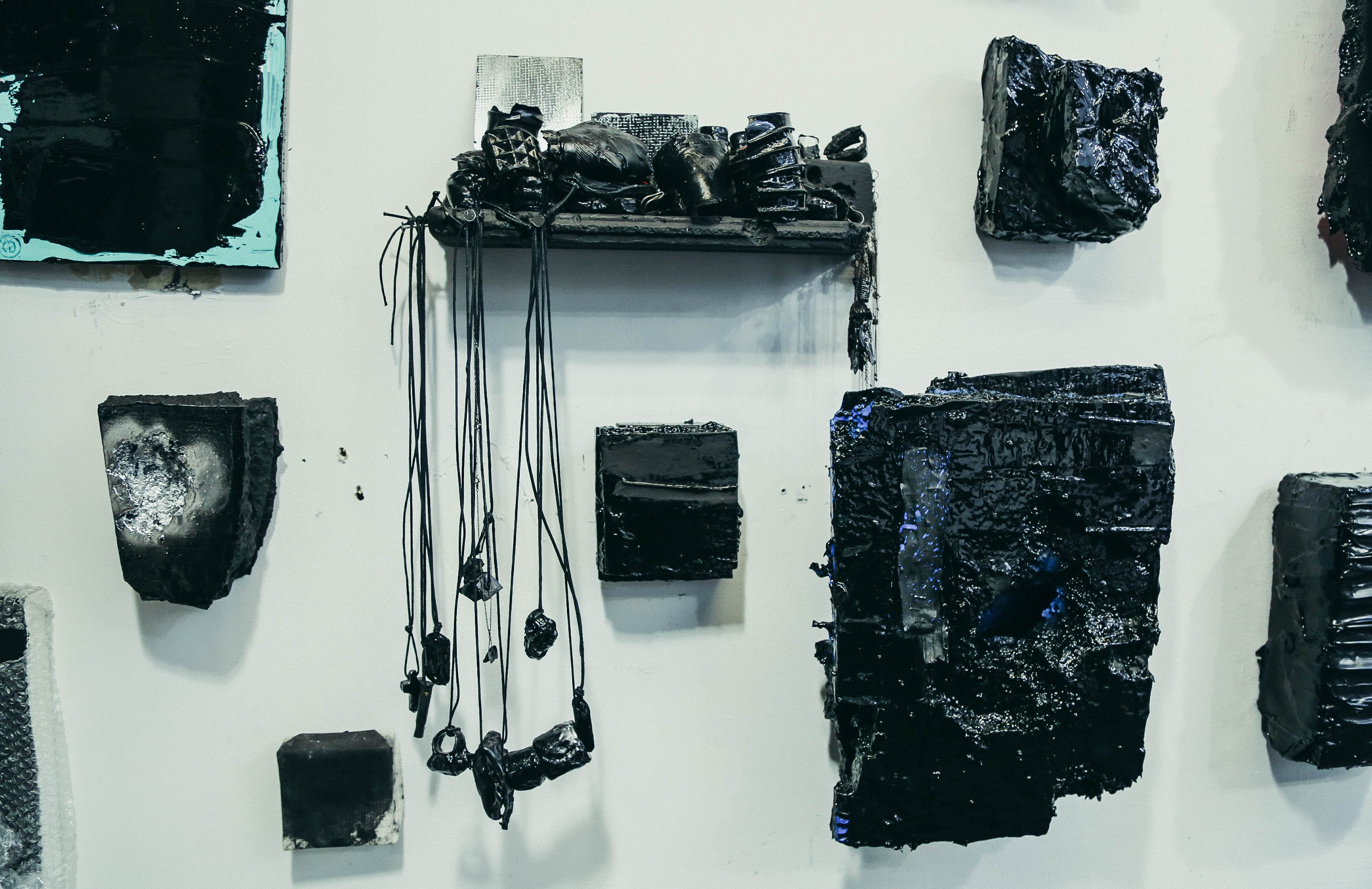
AZ: Where can we find your work?
GJS: On view at Maison Gerard in Manhattan. Gerardus and Benoist are super supportive of my work and really nice guys. They pair my work with some amazing French Art Deco and an eclectic mix of some really great contemporary designers. Originally I wasn’t sure if that would even work, turns out it works super beautifully. I’ve been with them just over a year now.
ARTWALK NY has a piece of mine up for auction this year, as does Locust Projects in Miami. I was also recently nominated and accepted into the Artist Pension Trust. I suppose I’ve got a lot of stuff going on. I get focused on making new work since I’m in the studio every single day. What’s next? I forget what’s going on right in the now, which reminds me I need to start meditating again…
photos // Hanna Hazel


